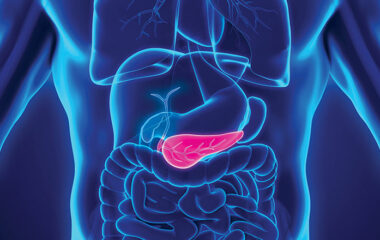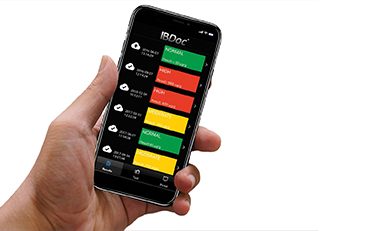- [email protected]
- +44 (0) 23 8048 3000
Calprotectin Patient Self-Testing in Practice
- Resource: IBDoc
- Date: June 24, 2016
User Report:
Faecal calprotectin is a well-established biomarker used to assess inflammation in the gut. Monitoring calprotectin concentrations is important as an indicator of disease activity, the effectiveness of treatment and to predict relapses in Inflammatory Bowel Disease (IBD). Recently introduced, BÜHLMANN IBDoc® now enables patient self-testing under remote consultation with their clinician.
The IBD Centre (IBDC) at Mercy University Hospital (MUH) in Cork, has one of the largest cohorts of IBD patients in Ireland and has been using faecal calprotectin since 2011. It became more widely used from 2012 and it is now considered standard practice for all patients.
Recently the team there introduced IBDoc® Calprotectin self-testing kits for their patients.
Kathleen Sugrue, Advanced Nurse in Inflammatory Bowel Disease, at MUH told us,
“Previously patient samples were sent to the local hospital for assessment of their calprotectin levels. However, there were long delays of usually around three weeks between sample collection and the availability of the test result.
The primary reason for considering IBDoc was that it would provide instant results and could be performed by the patient at home. This would allow us to make earlier clinical decisions, resulting in better outcomes for patients. It was also far more cost effective than the standard ELISA. We were confident that IBDoc would benefit patients, leading to increased patient satisfaction, greater compliance and empowerment as well as improving Quality of Care.”
Implementation of IBDoc at MUH:
“We launched IBDoc in June 2015 and were very enthusiastic about starting to use it which I think translated to the patients when we introduced the concept to them. We realised very quickly the positive impact it was having, both to Health Care Professionals and the patients, and it gained momentum from there. We were very proactive in offering IBDoc to our patients and were committed to providing access to as many of them as possible.
Little is known about the patient experience of using IBDoc and we wanted to evaluate the patient satisfaction. One hundred patients with IBD (aged 18-45 years), naïve to the IBDoc system, were trained to perform the system and asked to carry out a calprotectin stool test independently at home. The users then filled in a questionnaire to determine ease of use, the importance of the patients being able to view their results, reassurance that treatment is working, satisfaction with remote monitoring and its contribution to quality of care.”
Patient Feedback
- Ninety eight out of the one hundred users were able to generate a calprotectin test result independently
- All 100 respondents agreed that it was very important to them that they could view the result on their phone
- Eighty six percent of respondents felt that IBDoc made them feel more confident and reassured that their treatment was working
- One hundred percent preferred doing the test at home as opposed to bringing the sample to the hospital
Reasons cited for this included:
• Convenience
• Privacy
• Not having to travel to the hospital with a sample - Ninety seven percent of respondents felt that remote monitoring (such as IBDoc) is a positive progression in IBD services
- Overall satisfaction with IBDoc showed that 91% were very satisfied while the remaining 9% were satisfied
Patient Comments
“IBDoc is incredible, I no longer have to drive to the hospital with a sample. It is so much easier and more convenient and best of all I get instant results on my phone.”
“IBDoc is amazing and allows me to feel more in control of my Crohn’s disease. I can use it anytime to check if I’m having a flare up. It is very reassuring.“
“Before IBDoc I had to wait more than three weeks for a result, this is a very long time to worry. Now I can just check myself at home if I’m worried. I do a test before clinic appointments so I arrive with a result, this means my doctor or nurse can make decisions there and then depending on my result. I feel I am helping them.”
Kathleen summarises the advantages that the MUH has seen from trialling IBDoc.
For the Patient:
- Privacy/Dignity (ability to do it at home)
- Compliance (more willing to do the test at home rather than bring into hospital)
- Easier (does not have to travel to hospital to return sample)
- Early detection of flare-up/earlier intervention/better clinical outcomes
- Empowerment (getting result feels included in the decision making)
- Self-Management, increased motivation
- Free (No cost to the patient)
- Reassurance (psychologically reassuring that they can check at home if unsure if flaring up or not)
For Health Care Professionals:
- Fast Result
- Not invasive
- Reduces number of colonoscopies
- Cost effective
- Increased patient satisfaction/empowerment/compliance
- Early intervention/better clinical outcomes
- Remote monitoring/ Virtual Clinics
- Frees up clinic for patients who are fast tracked (flare ups)
- Increased Patient satisfaction
For the Organisation:
- Cost Effective: Costs less than lab based testing
- Reduced colonoscopies
- Facilitates Virtual Clinics (Reduced Out Patient visits)
- Increased Patient satisfaction
Kathleen concludes,
“IBDoc has far exceeded our expectations.
We have been overwhelmed at its popularity with patients and it has hugely enhanced the delivery of Quality of Care.”




